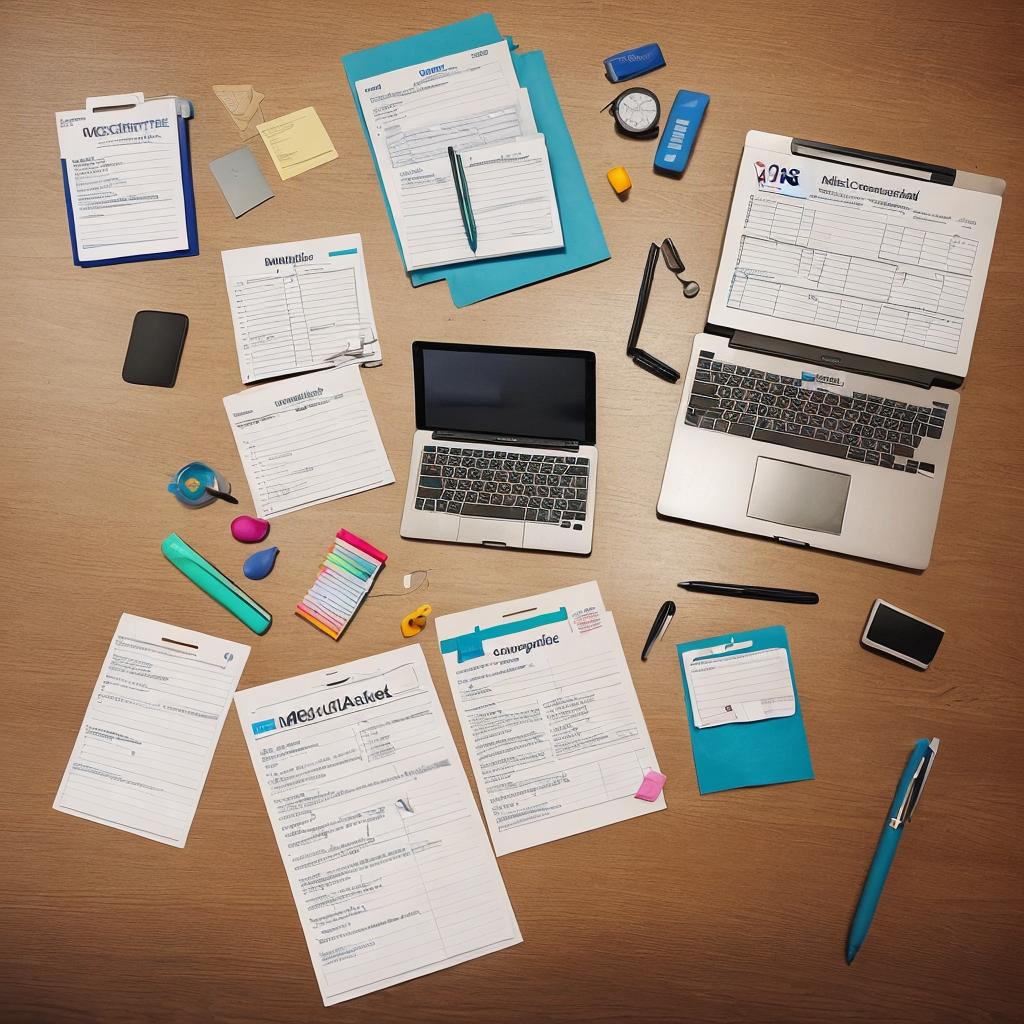Complete Checklist for Your Medicaid Application Paperwork

Are you applying for Medicaid and feeling overwhelmed by the paperwork? Don’t worry, we’ve got you covered!
In this article, we’ve prepared a complete checklist for your Medicaid application paperwork. From personal identification documents to financial and income documentation, medical records, proof of citizenship or immigration status, and additional supporting documents, we’ve compiled everything you need to ensure a smooth application process.
So, sit back, relax, and let us guide you through this important journey.
Key Takeaways
- Proof of citizenship or immigration status, such as a birth certificate or passport, is required for a Medicaid application.
- Financial and income documentation, including pay stubs, bank statements, and tax returns, is necessary to determine eligibility for Medicaid.
- Medical records and health information, such as medical history, records from healthcare providers, and documentation of disability benefits or diagnosis, are important for a Medicaid application.
- Other supporting documents, such as proof of income, proof of assets, documentation of medical expenses, and any relevant documents specific to the individual’s situation, may be required for a Medicaid application.
Personal Identification Documents
To apply for Medicaid, you’ll need to gather and provide personal identification documents. These documents are necessary to verify your identity and ensure that you meet the eligibility requirements for Medicaid.
The first document you’ll need is a proof of citizenship or immigration status. This can be a birth certificate, a passport, or a certificate of naturalization. Additionally, you’ll need to provide proof of residency, such as a utility bill or a lease agreement.
Another important document is your Social Security card. This card is essential for verifying your Social Security number, which is required for Medicaid application. Make sure to have your card readily available when you start the application process.
In order to confirm your income and financial situation, you’ll also need to provide certain documents. This includes pay stubs, bank statements, and tax returns. These documents will help determine your eligibility for Medicaid and the level of benefits you may qualify for.
Once you have gathered all the necessary personal identification documents, you can then proceed to gather the financial and income documentation required for your Medicaid application.
Financial and Income Documentation
Gather your financial and income documentation regularly to ensure a smooth Medicaid application process. Providing accurate and up-to-date information is crucial in determining your eligibility for Medicaid. Here is a checklist of the documents you should gather:
- Pay stubs: Include your most recent pay stubs for the past few months to demonstrate your income.
- Bank statements: Collect your bank statements from the past three to six months to show your financial resources.
- Tax returns: Prepare your most recent tax returns, including W-2 forms and 1099 forms, to verify your income.
- Proof of assets: Provide documentation of any assets you own, such as property or investments, as this may affect your eligibility.
- Proof of expenses: Keep track of your monthly bills and expenses, such as rent or mortgage payments, utilities, and medical expenses.
Medical Records and Health Information
Once you have gathered your financial and income documentation, it’s important to also compile your medical records and health information for your Medicaid application. Providing accurate and up-to-date medical records is crucial in determining your eligibility for Medicaid benefits.
Start by obtaining copies of your medical history, including hospitalizations, surgeries, and treatments. Make sure to include any relevant records from healthcare providers, such as doctors, specialists, and clinics. It’s also important to include information about any ongoing medical conditions, medications, and allergies that you have. If you have received any disability benefits or have been diagnosed with a disability, make sure to include documentation to support your claim. Additionally, include any recent lab results, X-rays, or other diagnostic tests that you have undergone.
Organize your medical records in a clear and chronological manner, making it easier for the Medicaid office to review your application. Remember, the more comprehensive and detailed your medical records are, the better chance you have of demonstrating your need for Medicaid assistance.
Now that you have compiled your medical records and health information, the next step is to gather proof of your citizenship or immigration status.
Proof of Citizenship or Immigration Status
Now that you have compiled your medical records and health information, it’s time to provide proof of your citizenship or immigration status. This step is crucial in your Medicaid application process, as it ensures that you meet the eligibility requirements set by the program.
To help you navigate this requirement, here is a checklist of the documents you may need to submit:
- Birth certificate: This document serves as proof of your citizenship if you were born in the United States.
- Certificate of Naturalization: If you became a U.S. citizen through the naturalization process, this document verifies your citizenship status.
- Permanent Resident Card: If you’re a lawful permanent resident, commonly known as a Green Card holder, you’ll need to provide a copy of your card.
- Employment Authorization Document (EAD): If you have a valid EAD, it demonstrates your lawful presence in the United States.
- Passport: A valid passport can serve as proof of both citizenship and immigration status.
Make sure to provide clear and legible copies of these documents when submitting your Medicaid application.
It’s important to note that the specific requirements may vary depending on your individual circumstances, so it’s always a good idea to consult with your Medicaid office or a legal professional to ensure you have the correct documentation.
Additional Supporting Documents
After providing proof of your citizenship or immigration status, the next step in your Medicaid application process is gathering additional supporting documents. These documents are essential to verify your eligibility and ensure a smooth application process.
Here is a checklist of the additional supporting documents you’ll need to provide.
Firstly, you’ll need to submit proof of your income. This includes recent pay stubs, tax returns, or documentation of any other sources of income such as Social Security benefits or child support. Make sure to include documents for all household members who are applying for Medicaid.
Secondly, you’ll need to provide proof of your assets. This includes bank statements, property deeds, and documentation of any other valuable belongings you own. It’s important to disclose all assets to determine your eligibility for Medicaid.
Additionally, you’ll need to provide documentation of your medical expenses. This can include bills, receipts, or statements from healthcare providers. It’s crucial to include all medical expenses incurred by you and your household members.
Lastly, you may be required to submit any other relevant documents specific to your situation. This could include proof of disability, proof of pregnancy, or any other supporting documents requested by your state’s Medicaid agency.
Gathering these additional supporting documents will ensure a successful and timely Medicaid application process. Make sure to double-check the requirements of your state’s Medicaid program to ensure you have all the necessary documents for a smooth application.
Frequently Asked Questions
Can I Apply for Medicaid if I Am Not a U.S. Citizen or Permanent Resident?
You can apply for Medicaid even if you’re not a U.S. citizen or permanent resident. There may be additional requirements or limitations for non-citizens, but you are still eligible to apply.
Is There an Age Limit for Medicaid Eligibility?
Yes, there is an age limit for Medicaid eligibility. You must be 65 years old or older, or meet certain disability requirements. It’s important to check the specific eligibility criteria in your state.
What Is the Income Limit to Qualify for Medicaid?
To qualify for Medicaid, you need to meet the income limit set by your state. This limit varies based on factors such as family size and location. Make sure to check with your state’s Medicaid office for the specific guidelines.
Can I Still Apply for Medicaid if I Don’t Have All the Required Documents?
Yes, you can still apply for Medicaid if you don’t have all the required documents. However, it’s important to provide as much documentation as possible to increase your chances of approval.
How Long Does the Medicaid Application Process Usually Take?
The Medicaid application process usually takes a few weeks. It involves submitting paperwork, providing necessary documents, and waiting for approval. Be prepared to answer questions and provide any additional information they may require.



